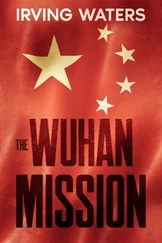Mary Waters - The Favorites
Здесь есть возможность читать онлайн «Mary Waters - The Favorites» весь текст электронной книги совершенно бесплатно (целиком полную версию без сокращений). В некоторых случаях можно слушать аудио, скачать через торрент в формате fb2 и присутствует краткое содержание. Жанр: Триллер, на английском языке. Описание произведения, (предисловие) а так же отзывы посетителей доступны на портале библиотеки ЛибКат.
- Название:The Favorites
- Автор:
- Жанр:
- Год:неизвестен
- ISBN:нет данных
- Рейтинг книги:5 / 5. Голосов: 1
-
Избранное:Добавить в избранное
- Отзывы:
-
Ваша оценка:
- 100
- 1
- 2
- 3
- 4
- 5
The Favorites: краткое содержание, описание и аннотация
Предлагаем к чтению аннотацию, описание, краткое содержание или предисловие (зависит от того, что написал сам автор книги «The Favorites»). Если вы не нашли необходимую информацию о книге — напишите в комментариях, мы постараемся отыскать её.
The Favorites — читать онлайн бесплатно полную книгу (весь текст) целиком
Ниже представлен текст книги, разбитый по страницам. Система сохранения места последней прочитанной страницы, позволяет с удобством читать онлайн бесплатно книгу «The Favorites», без необходимости каждый раз заново искать на чём Вы остановились. Поставьте закладку, и сможете в любой момент перейти на страницу, на которой закончили чтение.
Интервал:
Закладка:
“What about your ships…?” asked Mrs. Asaki. The Sosetsus’ import business was the mainstay of their wealth.
“Gone,” said one of the sons bitterly. “All except two that were out at sea. Our entire fleet was in that harbor.”
Mrs. Asaki was enthralled in spite of herself. An entire fleet, destroyed! Her in-laws had sunk from wealth to poverty in the blink of an eye.
“I can’t get over it,” she said later that night to her husband. “What a change of fortune!”
“It could have been us,” he said in dazed wonder.
“Yes, it could have been us…” They were silent, pondering the upheaval the war had brought. The Asakis were doing better than their neighbors, even in this time of food rationing. Mr. Asaki was a high school superintendent. His public office gave him access to black-market channels in the prefectural bribery system. And Mrs. Asaki had farming relatives out in the country, a fact that had once embarrassed her.
“They can’t possibly squeeze into that little house,” Mr. Asaki said.
“Of course not!” There were six of them: Mrs. Kobayashi, her mother, three siblings ranging in age from thirteen to twenty, and four-year-old Yoko. When Mrs. Kobayashi delivered her baby, there would be seven in all. “She and Yo-chan should move in with us,” she said, “till that family gets back on their feet.”
She ran her eyes over the too-large house-the wide expanse of tatami matting, the long empty halls. She and her husband had always hoped for children. But now, on the brink of forty, she knew it was never going to happen.
“It’ll be nice,” she said, “having small children here.”
The months passed. Japan surrendered in 1945. Mrs. Kobayashi gave birth to a baby girl called Masako.
One day Mrs. Sosetsu paid the Asakis a formal call and announced they were moving back to Kobe. “We have a hard road ahead,” she said, “but Kobe is our home.” Her bows were deep and controlled, but the emotion in her face was real. “We can never repay you for what you’ve done,” she said. “We’ll never forget your kindness.”
“Not at all, not at all,” said Mr. Asaki. He and his wife bowed back in unison. “We wish you all the best.”
“We wish you all the best,” echoed Mrs. Asaki. This house was going to be lonely without little Yoko and the baby.
That night at dinner she asked, “Will you be moving back to Kobe as well?” Her eyes shifted from her sister-in-law to the baby strapped on her back. Masako was fast asleep; her cheek, round and soft as a dumpling, lay against her mother’s shoulder.
“I’d like to,” said Mrs. Kobayashi wistfully. “But there aren’t any jobs in Kobe for someone like me. My children and I would just be a burden.” She paused. “No no, Yo-chan,” she told the little girl, who was reaching across the table with her chopsticks. “If you want more radishes, say, ‘Please pass the radishes.’”
“Please pass the radishes,” said Yoko obediently.
“When this rationing is over,” said Mr. Asaki jovially, “we’ll have meat again! And fresh fish from the coast! What do you think about that!”
The child looked at him blankly, then turned her attention to the boiled radishes.
“I’ll move back across the street and get an office job,” said Mrs. Kobayashi.
“Yes,” said Mrs. Asaki, “and I can look after the children.”
Mr. Asaki, who came from a traditional Kyoto family, looked up sharply from his rice bowl. “Times may be bad,” he said, “but not so bad that a woman under my care has to go out in the workplace to be ordered about by strangers. What you need to do is get remarried.”
Mrs. Kobayashi looked young and trapped. Mrs. Asaki’s heart went out to her. Ever since Shohei died, the two women had become close. But Mrs. Asaki’s sympathy was still tinged with a smug sort of pleasure in knowing that her sister-in-law’s charmed days were now behind her.
Her husband, as if thinking along these same lines, continued. “You’re not a privileged young girl anymore, working for pocket money.” Then, more gently, “I know something of this world. I know it isn’t kind or respectful to women over a certain age who work for their food. And you’d barely support your children on what you’d make.”
“He’s right, dear,” said Mrs. Asaki. “Servitude in some office isn’t the answer.”
They were silent. Baby Masako flung out an arm in sleep. Little Yoko hunched over her bowl, picking out one grain of rice at a time with her chopsticks.
“Besides,” said Mr. Asaki, “how many multinational companies are there in Kyoto anyway?” He leaned back and took a swallow of tea.
“Let’s think on it, ne, dear?” said Mrs. Asaki soothingly. “We’ll put our heads together and come up with a really good plan.”
It was then that the wheels in her mind began to turn.
chapter 25
The morning after Yoko’s death, Mrs. Nishimura headed down the lane with a bulky bundle-food and various supplies-wrapped in a purple silk furoshiki cloth. Mrs. Asaki stood on the upstairs balcony, hanging up socks and handkerchiefs to dry, and watched her go. Her daughter looked up and waved with her free hand. She waved back.
Later that day Mrs. Nishimura came home with a wealth of information. She recounted it all in painstaking detail, as if to ease her mother’s mind by being as transparent as possible.
There would be no funeral, she said. Since Yoko had married into the Rexford family, it was technically not the Kobayashis’ place to give her one.
“I’m sure the funeral in America will be very nice,” Mrs. Asaki said.
Momoko looked doubtful. “I heard they don’t even have cremation ceremonies in America,” she said.
“That doesn’t matter. At least they do cremations.”
By all rights Mrs. Rexford’s ashes should have stayed overseas as the property of her husband’s family. “But it’s not as if there’s a Rexford cemetery,” Mrs. Nishimura explained, “or even a Rexford family.” Apparently Mr. Rexford had always planned to have his ashes scattered over the ocean. While that option was fitting and right for her father, Sarah had thought it wrong, somehow, for her mother. Although Mrs. Rexford had never actually stated her burial preference, other than to say she wanted cremation, Sarah felt sure she would have wanted to be buried in her homeland.
“Well, naturally!” said Mrs. Asaki.
Over the next few days, Mrs. Nishimura took charge of the wake preparations. While Mr. and Mrs. Kobayashi dealt with the voluminous paperwork for the temple’s genealogical records (they were complex and highly accurate, going back for centuries), Mrs. Nishimura transformed the parlor. She set up a long low table, covered with a ceremonial white cloth, in front of the tokonoma alcove. She sifted through family photographs to find the most recent picture of Mrs. Rexford, which she framed and decorated with a black funerary band. This would stand on the low table, along with the cremated remains when they arrived. She bought incense sticks and small prayer candles for visitors to light when they came to pay their respects. Since incense had to be burned round the clock until the burial, she stocked up on special twelve-hour sticks that would burn through the night. She placed an order to have a personalized tablet made; this would be placed in the family altar after the burial.
More news followed. Mrs. Kobayashi had made private arrangements with the temple authorities to have her daughter’s ashes laid to rest in the Kobayashi family plot.
“How did she manage that?” cried Mrs. Asaki in astonishment. “Yo-chan married out of the family line!”
“No one knows,” said Mrs. Nishimura in her soft voice. “But a bereaved and determined mother can do surprising things.”
Читать дальшеИнтервал:
Закладка:
Похожие книги на «The Favorites»
Представляем Вашему вниманию похожие книги на «The Favorites» списком для выбора. Мы отобрали схожую по названию и смыслу литературу в надежде предоставить читателям больше вариантов отыскать новые, интересные, ещё непрочитанные произведения.
Обсуждение, отзывы о книге «The Favorites» и просто собственные мнения читателей. Оставьте ваши комментарии, напишите, что Вы думаете о произведении, его смысле или главных героях. Укажите что конкретно понравилось, а что нет, и почему Вы так считаете.












